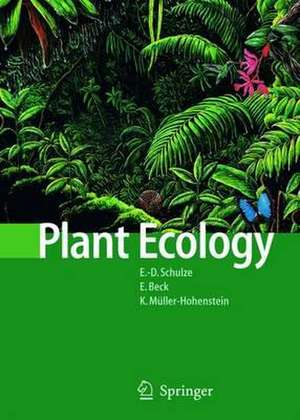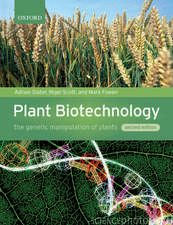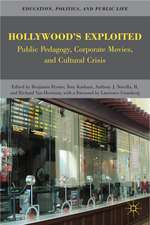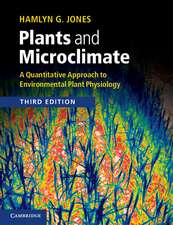Plant Ecology
Autor Ernst-Detlef Schulze Traducere de David Lawlor Autor Erwin Beck Traducere de Kirsten Lawlor Autor Klaus Müller-Hohenstein Traducere de Gudrun Lawloren Limba Engleză Paperback – 13 oct 2010
- Molecular ecophysiology (stress physiology: light, temperature, oxygen deficiency, drought, salt, heavy metals, xenobiotica and biotic stress factors)
- Autecology (whole plant ecology: thermal balance, water, nutrient, carbon relations)
- Ecosystem ecology (plants as part of ecosystems, element cycles, biodiversity)
- Synecology (development of vegetation in time and space, interactions between vegetation and the abiotic and biotic environment)
- Global aspects of plant ecology (global change, global biogeochemical cycles, land use, international conventions, socio-economic interactions)
The book is carefully structured and well written: complex issues are elegantly presented and easily understandable. It contains more than 500 photographs and drawings, mostly in colour, illustrating the fascinating subject.
The book is primarily aimed at graduate students of biology but will also be of interest to post-graduate students and researchers in botany, geosciences and landscape ecology. Further, it provides a sound basis for those dealing with agriculture, forestry, land use, and landscape management.
Preț: 769.80 lei
Preț vechi: 938.77 lei
-18% Nou
Puncte Express: 1155
Preț estimativ în valută:
147.30€ • 153.79$ • 121.91£
147.30€ • 153.79$ • 121.91£
Carte tipărită la comandă
Livrare economică 05-19 aprilie
Preluare comenzi: 021 569.72.76
Specificații
ISBN-13: 9783642058745
ISBN-10: 3642058744
Pagini: 702
Ilustrații: X, 702 p. 506 illus., 450 illus. in color.
Dimensiuni: 193 x 270 x 40 mm
Greutate: 1.66 kg
Ediția:2005
Editura: Springer Berlin, Heidelberg
Colecția Springer
Locul publicării:Berlin, Heidelberg, Germany
ISBN-10: 3642058744
Pagini: 702
Ilustrații: X, 702 p. 506 illus., 450 illus. in color.
Dimensiuni: 193 x 270 x 40 mm
Greutate: 1.66 kg
Ediția:2005
Editura: Springer Berlin, Heidelberg
Colecția Springer
Locul publicării:Berlin, Heidelberg, Germany
Public țintă
ResearchCuprins
Stress Physiology.- Environment as Stress Factor: Stress Physiology of Plants.- Light.- Temperature.- Oxygen Deficiency (Anaerobiosis and Hypoxia).- Water Deficiency (Drought).- Salt Stress (Osmotic Stress).- Heavy Metals.- Aluminium.- Xenobiotics.- Biotic Stress: Herbivory, Infection, Allelopathy.- Autecology: Whole Plant Ecology.- Thermal Balance of Plants.- Water Relations of Plants.- Nutrient Relations of Plants.- Carbon Relations.- Ecology of Ecosystems.- The Ecosystem Concept.- Processes in Stands and Ecosystems.- The Biogeochemical Cycles.- Biodiversity and Ecosystem Processes.- Case Studies at the Scale of Ecosystems.- Syndynamics, Synchorology, Synecology.- Historic-Genetic Development of Phytocenoses and Their Dynamics.- Synchorology: Basis of Spatial Distribution of Plants.- Interactions Between Vegetation and Abiotic and Biotic Environments — Synecology.- Global Aspects of Plant Ecology.- Global Change and Global Institutions.- Global Element Cycles.- Human Impacts on the Carbon Budget and Its Significance for the Global Climate.- Significance of Changes in Land Use for the Global Carbon Cycle.- Influence of Human Activities on Biodiversity.- Socio-economic Interactions.
Notă biografică
Textul de pe ultima copertă
Plant Ecology provides a unique and up-to-date treatment of all aspects of the field, making it ideally suitable as a textbook and reference work for students, researchers and practitioners.
More than 500 high-quality images and drawings, mostly in colour, aid the reader in visualizing and understanding numerous key topics. Its clear structure and straightforward style make it user friendly and particularly accessible for students. The integrity and authoritativeness of the information is guaranteed by an experienced author team.
Whilst Plant Ecology is primarily aimed at graduate students of biology, post-graduate students and researchers in botany, geosciences and landscape ecology will also find this text invaluable as a reference work. In fact, everybody whose study or work touches on agriculture, forestry, land use, and landscape management will find this text a rich learning experience.
Key Topics:
- Molecular ecophysiology (stress physiology: light, temperature, oxygen deficiency, drought, salt, heavy metals, xenobiotica and biotic stress factors)
- Autecology (whole plant ecology: thermal balance, water, nutrient, carbon relations)
- Ecosystem ecology (plants as part of ecosystems, element cycles, biodiversity)
- Synecology (development of vegetation in time and space, interactions between vegetation and the abiotic and biotic environment)
- Global aspects of plant ecology (global change, global biogeochemical cycles, land use, international conventions, socio-economic interactions)
From the reviews of the German-language edition:
"No other work is as compact and comprehensive in comparison. … nobody dealing with plant ecology in any form can afford to pass by this book." (Entomologia Generalis)
"With Plant Ecology, a new botanical standard work has been born. ... a worthwhilepurchase." (www.pflanzenbuch.de)
"A book with scientific depth – a future standard work. Its up-to-date and global approach alone make it of interest to a large target group. ... Numerous images, tables, flow charts, graphics, and memory boxes facilitate comprehension. The comprehensive manner in which individual topics are presented make the book both a sound textbook and reference work." (Forstzeitung)
"The book is carefully structured and well written, and thus even complex issues as the self-thinning rule are elegantly presented and easily understandable. The register is extensive and represents certainly a useful selection of the most important key words. ... I recommend this book to advanced students, university teachers and other researchers in (plant) ecology, it is also inspiring reading for high school teachers." (Phytocoenologia)
More than 500 high-quality images and drawings, mostly in colour, aid the reader in visualizing and understanding numerous key topics. Its clear structure and straightforward style make it user friendly and particularly accessible for students. The integrity and authoritativeness of the information is guaranteed by an experienced author team.
Whilst Plant Ecology is primarily aimed at graduate students of biology, post-graduate students and researchers in botany, geosciences and landscape ecology will also find this text invaluable as a reference work. In fact, everybody whose study or work touches on agriculture, forestry, land use, and landscape management will find this text a rich learning experience.
Key Topics:
- Molecular ecophysiology (stress physiology: light, temperature, oxygen deficiency, drought, salt, heavy metals, xenobiotica and biotic stress factors)
- Autecology (whole plant ecology: thermal balance, water, nutrient, carbon relations)
- Ecosystem ecology (plants as part of ecosystems, element cycles, biodiversity)
- Synecology (development of vegetation in time and space, interactions between vegetation and the abiotic and biotic environment)
- Global aspects of plant ecology (global change, global biogeochemical cycles, land use, international conventions, socio-economic interactions)
From the reviews of the German-language edition:
"No other work is as compact and comprehensive in comparison. … nobody dealing with plant ecology in any form can afford to pass by this book." (Entomologia Generalis)
"With Plant Ecology, a new botanical standard work has been born. ... a worthwhilepurchase." (www.pflanzenbuch.de)
"A book with scientific depth – a future standard work. Its up-to-date and global approach alone make it of interest to a large target group. ... Numerous images, tables, flow charts, graphics, and memory boxes facilitate comprehension. The comprehensive manner in which individual topics are presented make the book both a sound textbook and reference work." (Forstzeitung)
"The book is carefully structured and well written, and thus even complex issues as the self-thinning rule are elegantly presented and easily understandable. The register is extensive and represents certainly a useful selection of the most important key words. ... I recommend this book to advanced students, university teachers and other researchers in (plant) ecology, it is also inspiring reading for high school teachers." (Phytocoenologia)
Caracteristici
Covers the field from the molecular to the global level in unprecedented breadth and depth Contains more than 500 - mostly colour- photographs and drawings Presents complex issues in an easily understandable way Includes supplementary material: sn.pub/extras


























